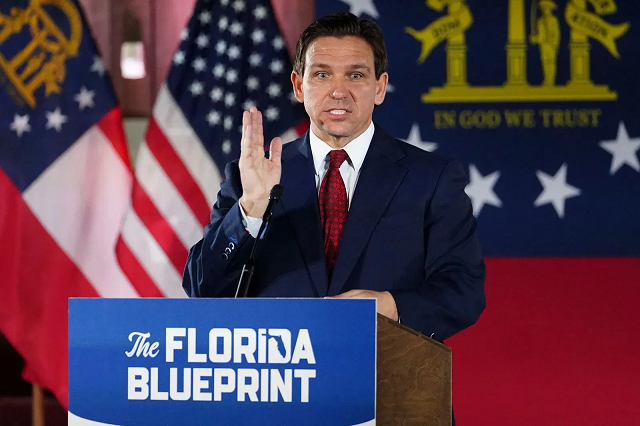(As originally published with bells and whistles, Wed, April 26th 2023, 4:42 PM EDT)
Florida Gov. Ron DeSantis seems to relish not being a candidate for president of the United States.
Sure, he started many news conferences bashing President Joe Biden before getting down to the matter at hand. Remember his “Bidenflation” mentions for more than a year?
DeSantis has also commented on foreign policy and not just in ways a Florida governor normally would. Besides Latin America and Israel, he has taken strong stands on the Mexican border, China, and — perhaps to his regret — Ukraine.
Meanwhile, pollsters have regularly been announcing new numbers, comparing him to former President Donald Trump, who announced his own 2024 bid. Plus, Trump’s antagonism (“Ron DeSanctimonious”) is helping his national profile.
And, he wrote a book saying his policies in Florida should be a blueprint for the country. Didn’t read it? The term-limited governor has been raking in money and one of the super PACs supporting was putting ads on national TV.
So, it was no surprise that weeks after winning reelection in November, leaders of the Florida legislature were talking about changing the state’s election laws so DeSantis could run for president without resigning as governor, in case he loses.
Now, five months later, the Republican supermajority is racing to pass a bill that would let DeSantis do just that.
The bill, called An Act Relating to Elections, got its second reading in the state Senate on Wednesday.
It deals with issues such as third-party voter registration organizations and making sure anybody submitting signatures pay in advance for the signatures to be checked, but Tuesday, Sen. Travis Hutson, R-St. Augustine, filed a rather lengthy amendment to the bill he sponsored.
Way down on page 37, on line 1026, he takes care of some housekeeping by re-numbering a section of law.
Then, on line 1031, he refers to Section 99.012, called “Restrictions on individuals qualifying for public office.”
Finally, on lines 1036 and 1037, he makes his point:
This section does not apply to: Persons seeking the office of President or Vice President of the United States.
But Hutson wasn’t finished. Far from it. His amendment goes on for 97 pages.
Next, starting on line 1039, is Section 14 and it’s “intended to clarify existing law.
Any person seeking the office of President or Vice President of the United States is not subject to the requirements of chapter 99, Florida Statutes, which govern candidate qualifying, specifically those which require the submission of certain documents, full and public disclosures of financial interests, petition signatures, or the payment of filing fees. This section shall take effect upon this act becoming a law.
That’s the entire section which, when clarified, seems much more like a complete 180-degree change than an attempt to “clarify existing law.”
Florida Statutes Chapter 99, on political candidates, contains Section 99.012, called “Restrictions on individuals qualifying for public office.”

Subsection (4)(a) says, “Any officer who qualifies for federal public office must resign from the office he or she presently holds if the terms, or any part thereof, run concurrently with each other.”
DeSantis is an “officer” since he “has the authority to exercise the sovereign power of the state pertaining to an office recognized under the State Constitution or laws of the state,” as the word is described at the beginning of the chapter, 99.012(1)(a), specifically.
Also, the terms would “run concurrently with each other.”
DeSantis won reelection in November 2022. His term runs from January 2023 to January 2027. The presidential election will take place in November 2024, for a term beginning in January 2025, two years before DeSantis would leave office.
Later in the subsection of law, (4)(e) lists three categories of officers and says they should either “submit their resignations to the governor,” or submit their resignation elsewhere with “a copy to the governor.”
That seemingly would not apply to DeSantis, who is the governor.
However, (f)1. perhaps — What’s the word? — “clarifies” that loophole.
It reads, “The failure of an officer who qualifies for federal public office to submit a resignation pursuant to this subsection constitutes an automatic irrevocable resignation, effective immediately, from the office he or she presently holds.
That’s all the law as it stands today.
The current Subsection (7) simply says, “This section does not apply to:” and what’s underneath are “political party offices” and “persons serving without salary as members of an appointive board or authority.”
The line about changing the section not applying to Presidential or Vice-Presidential candidates changes the law in DeSantis’ favor.
The governor’s friends in the supermajority haven’t turned him down on anything during this year’s session. (Ask the folks at Disney.)

Now, the session is winding down. Lawmakers are wrapping up their business. Other Republican candidates are hard at work to undermine his campaign before it begins.
Leaving DeSantis out of the law all but guarantees he’ll throw his hat into the ring.





Comments